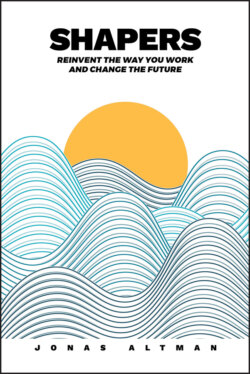Читать книгу Shapers - Jonas Altman - Страница 14
WORK AS AN EXPRESSION NOT A PLACE
ОглавлениеWith the advent of the microchip in the 1970s and acceleration of economic globalisation in the 1980s, work slowly became unhinged from geographical limitations. With a strong WiFi connection it became easier to pool resources from any capable worker anywhere. Peter Drucker's knowledge worker entered his or her heyday and companies began duking it out to retain their greatest asset: their people. The war for talent continues today.
The tools and practices of knowledge management blossomed in the 1990s to support the new wave of workers. Futurist and early shaper, Alvin Toffler had long imagined a knowledge economy that would require a system for workers to create, process, and boost their knowledge–because, for the first time ever, we would own the ‘technology of consciousness’.
Information would also need to be managed and shared between colleagues. Organisational theorist Ikujiro Nonaka, another pioneer shaper, wanted to help managers appreciate how knowledge–the fuel for innovation–could be leveraged. He viewed the organisation as an organism that requires constant renewal; and knowledge workers as the designated change agents.
Indeed, the information economy is growing and the wave of knowledge workers continues to swell higher. To that end, most of the ideas in this book are focused on the knowledge economy and those who consistently gather, process, and distribute information. There is becoming less need to trek to, and suffer in, a spirit‐sapping office. The most important weapon for businesses today is the ability to empower their workers. Shapers want to be challenged like a superhero, not confined to a cage like a zoo animal. And if the firm fails to provide us with what we crave, we'll go elsewhere or simply fuel ourselves.
The most important weapon for businesses today is the ability to empower their workers. Shapers want to be challenged like a superhero, not confined to a cage like a zoo animal.
In the developed world we are fortunate to have plenty of opportunities to entertain such aspirations. Many, both inside and outside of advanced economies, don't have the same good fortune. A whopping 40% of Americans are ‘liquid asset poor’, or–in plain English–just one paycheck away from poverty.
Still we lay about daydreaming about the endless ways we might express ourselves, whether it be as a coffee connoisseur, YouTube sensation, kitesurfing pro, or venture capitalist. The choice has become paradoxical. As our expectations for self‐expression grow, we may be left deflated and our lofty dreams remain unfulfilled. We long to give life to any or all of our multitudinous selves. Peeling back another layer of the onion reveals that our current crisis of work is also a psychological one.
Of course, things will appear to have different shades to different people depending on their point of view. Flexible work often misconstrued as ‘working from home’, is all about choice. Seasoned flex workers weave their careers in a way that best suits their talents, skills, and attitude. Sociologist Sebastian Pranz writes:
They exploit the full potential of their social networks and profit from the fact that, both spatially and mentally, they are now only loosely connected to a company. Flexible work creates a certain culture that has shifted from the structural conditions of job markets to the self‐identification of the company and from there it gradually seeps into the worldviews of the workers and their families. ‘New capitalism’ becomes a new way for us to think about ourselves, our work and our life.
For centuries, wage labour has commanded that we get our kicks elsewhere. Human flourishing has played second fiddle to the capitalist agenda. But shapers yearn to do work that pays by fulfilling the soul. And now, at last, shapers are able to direct their own energies and remove the shackles that restricted the possibility for meaningful work.
